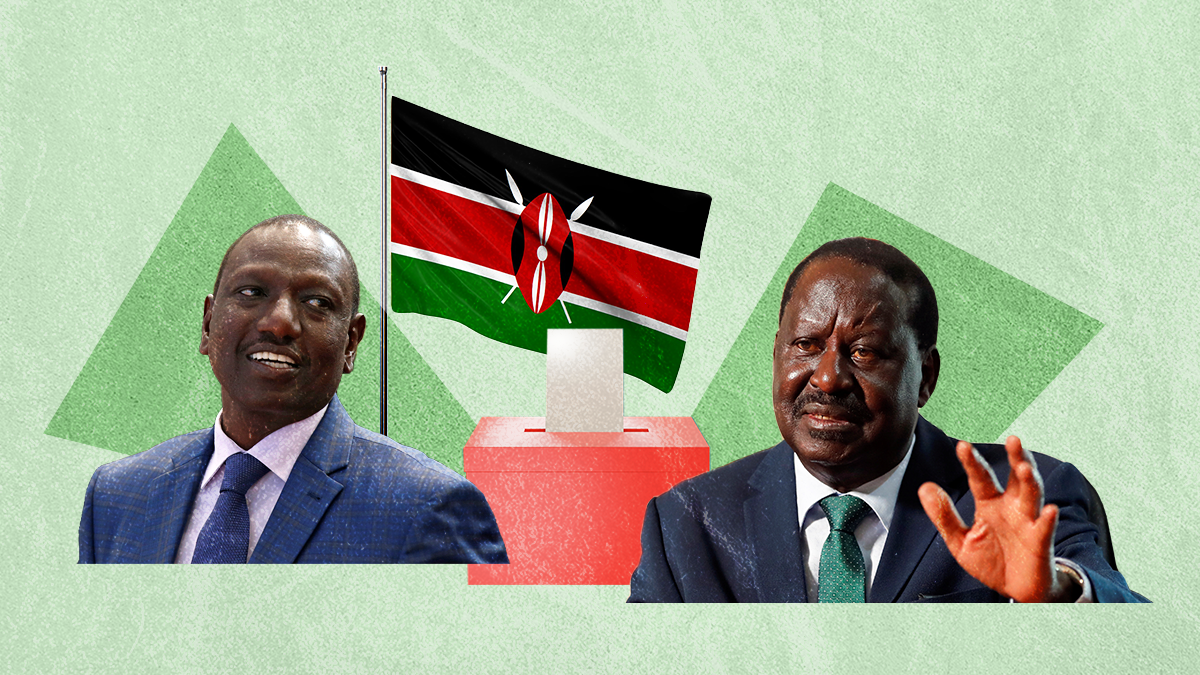Kenyans go to the polls Tuesday to elect a successor to term-limited President Uhuru Kenyatta, who’s stepping down after 10 years in East Africa’s economic hub. But their choice is limited to one between Kenyatta’s longtime enemy-turned-ally, or the president’s own VP, who’s running against Kenyatta’s record (and therefore his own).
Huh? Please explain. The pro-administration candidate is opposition leader Raila Odinga, who's running for president for the fifth time. He lost the last two elections to Kenyatta. But in 2018, the two patched things up with a very public handshake, leaving Deputy President William Ruto as the odd man out.
Dynasty vs. “hustler.”Odinga, the scion of a famous political dynasty, is pitching himself as "Baba" (father) of the nation. He vows to give affordable healthcare to all Kenyans and a $50 monthly stipend to poor people.
For his part, Ruto — a former chicken vendor who claims he didn't own a pair of shoes until he was 15 — says he'll be the champion of the poor (although now he’s a wealthy landowner). Still, the 55-year-old promises to support young Kenyan “hustlers,” and being the first candidate not from a political family with a shot at winning the top job is nothing to sneeze at.
The two, however, have serious Kenyatta baggage. "Both men are struggling to disassociate themselves from the current administration," says Eurasia Group analyst Connor Vasey.
Indeed, the outgoing president has a mixed record: infrastructure development boomed on his watch, but so did graft and debt. Earlier this year, the Supreme Court nixed his plan to reform the constitution and appoint himself PM.
Ruto, Vasey explains, is trying to take credit for Kenyatta's achievements "while also explaining why he is not responsible for its failings, and [...] why he would do better this time." Meanwhile, Odinga can hardly claim to be the progressive alternative "while also leveraging his relationship with [a] conservative president whose track record he has long criticized."
What most Kenyan voters want is a leader who’ll do something different to fix tangible problems like rising food and fuel prices or youth unemployment. But they won't get much change from Odinga or Ruto, who are "basically just two versions of continuity," says political commentator and cartoonist Patrick Gathara.
"They are not new entities. And I don't think there's an expectation that what they are saying or what they are promising would be anything revolutionary," Gathara adds. "Kenyans [...] don't expect that if one takes power at the expense of the other, that would make a huge difference in how the country is run."
Why should people vote at all then? Kenya has by far the most competitive democracy in East Africa, where strongmen have carried the day more often than not. And while previous elections have been marred by violence, few are expecting widespread unrest this time around.
Still, Gathara believes that voting alone is not enough.
"There has been a huge emphasis on elections and on especially switching the people running the country — as if that would itself lead to a more serious attempt to actually fix [Kenya's] problems," he says. "But we've been on this merry-go-round since the 1950s and seen that it's really not about who's in power, but [rather] the system that they run. And this is a system that, in essence, is inherited from colonialism and never changed."
Until all Kenyans push to reform how politics work from the grassroots, Gathara laments, "voting can only take us so far."
Meanwhile, Odinga and Ruto are so tight in the surveys that the election could go to a runoff for the first time if neither gets 50% of the vote. In that case, the surprise kingmaker might be longshot presidential hopeful George Wajackoya, now polling a distant third at around 3% and with a few interesting ideas on how to make Kenya great.
If he were president, Wajackoya would legalize cannabis and boost trade with Asia by selling erectile dysfunction “medicine” made with … hyena testicles. No wonder he's the only "change" candidate.
This comes to you from the Signal newsletter team of GZERO Media. Subscribe for your free daily Signal today.
